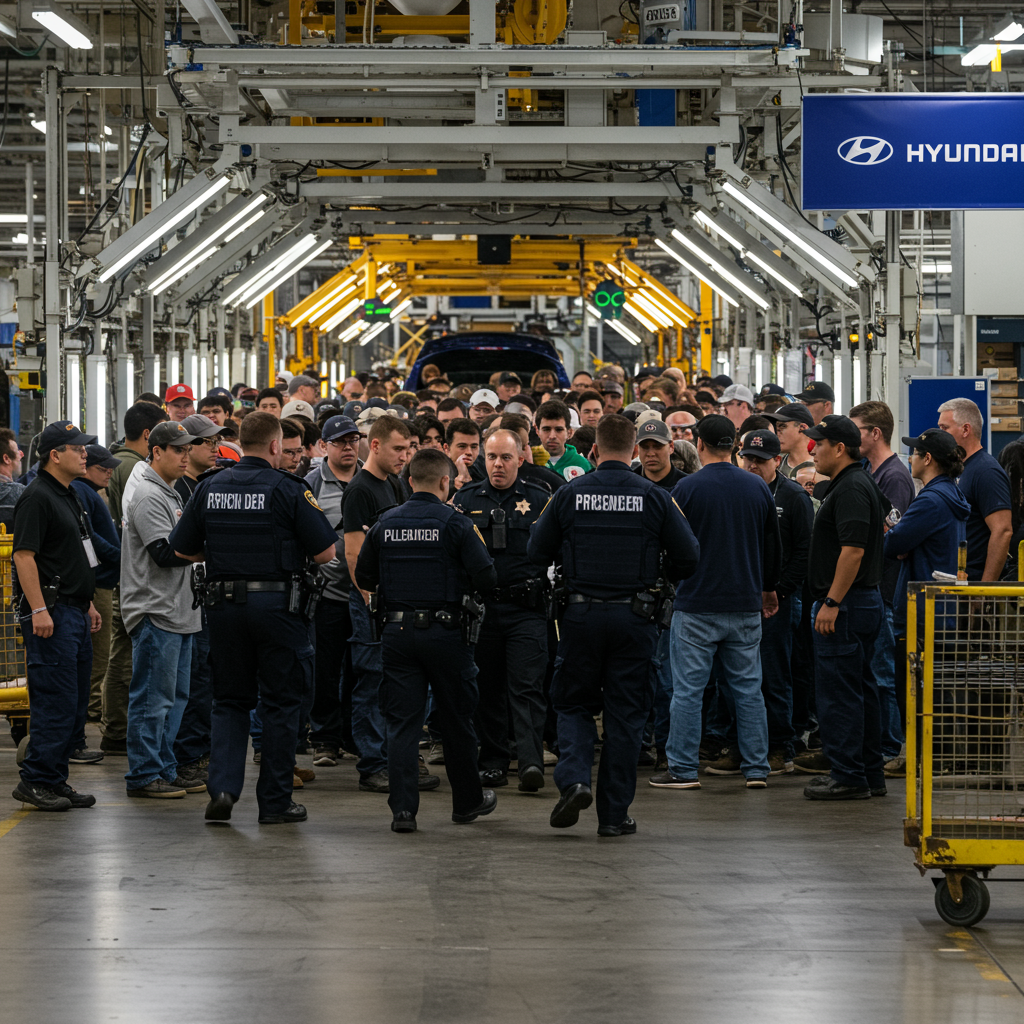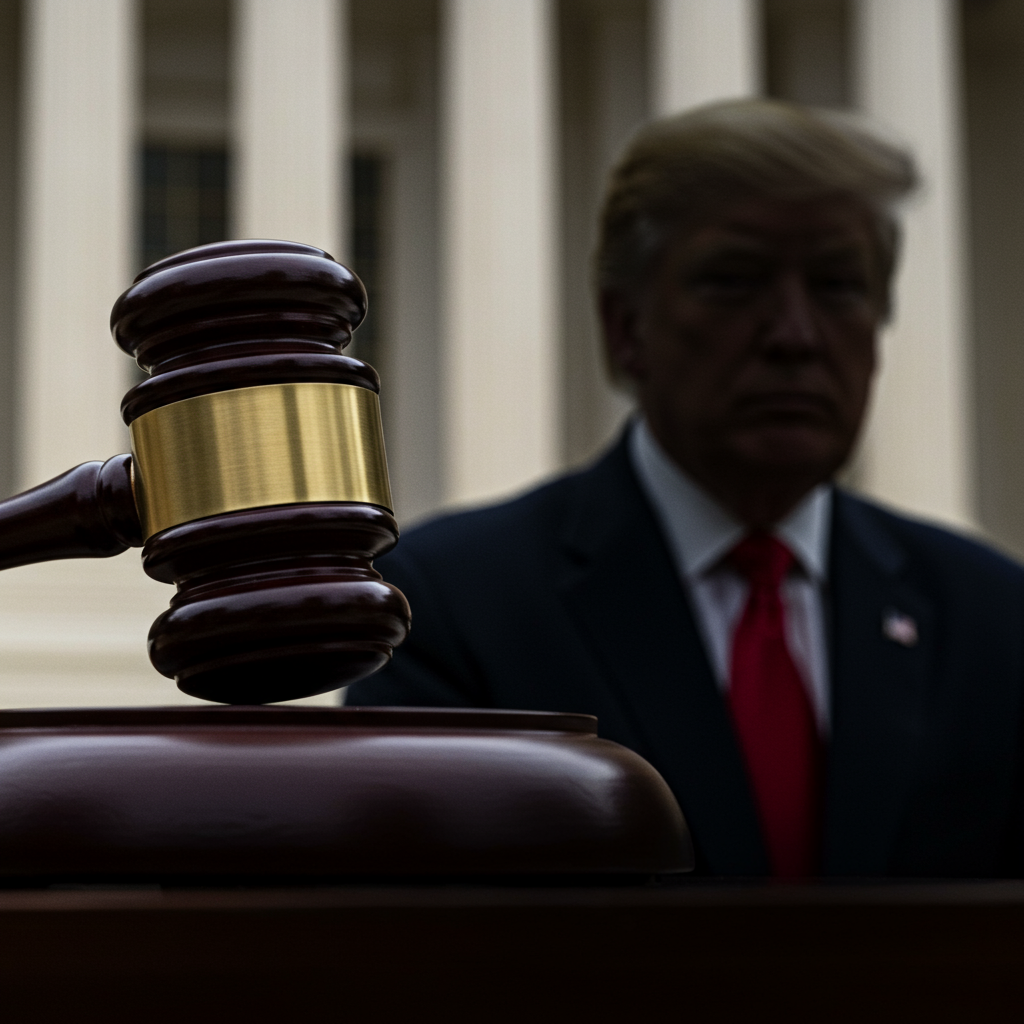A federal immigration sweep at a Hyundai facility in Ellabell, Georgia, has resulted in the detention of hundreds of workers, primarily South Korean nationals, igniting a diplomatic firestorm. This unprecedented operation, described as the largest single-site enforcement action in the Department of Homeland Security’s history, has triggered immediate and strong condemnation from South Korea, a vital American ally and trading partner. The incident casts a stark spotlight on the intricate balance between fostering foreign investment and enforcing federal immigration laws, threatening to strain critical US-South Korea relations amidst significant economic pledges.
The Georgia Raid Unfolds: A Massive Enforcement Operation
On a recent Thursday, federal and immigration agents from Homeland Security Investigations (HSI) and Immigration and Customs Enforcement (ICE) descended upon the joint Hyundai and LG Energy Solution site in Ellabell, Georgia. This facility is crucial for the production of electric vehicles and batteries, representing a substantial economic asset for the state. The raid was executed under a judicial search warrant, part of an ongoing criminal investigation into alleged unlawful employment practices.
Operation Scope and Tactics
The scale of the operation was staggering. Agents detained 475 individuals, with initial reports indicating that the vast majority were South Korean nationals. Eyewitness accounts and video footage released by ICE depicted scenes of armed and masked officers lining up workers, checking identification, and apprehending those in violation of immigration statutes. Some workers reportedly attempted to evade arrest by hiding in air ducts or a sewage pond. Those detained, some visibly shackled and wearing company-branded vests, were subsequently transported to the Folkston ICE Processing Centre in Georgia. This dramatic display underscored the aggressive nature of the Trump administration’s escalating crackdown on immigration enforcement.
South Korea’s Urgent Response and Diplomatic Mobilization
News of the mass detentions sent shockwaves through Seoul, prompting an immediate and robust response from the South Korean government. President Lee Jae-myung promptly ordered “all-out efforts” to assist the detained citizens, emphasizing that the rights of South Koreans “must not be unjustly infringed.”
Seoul Mobilizes for Citizens
Foreign Minister Cho Hyun publicly expressed “deep concern” and a “heavy sense of responsibility” for the arrests during an emergency government meeting. He announced the swift establishment of an Overseas Korean Protection Task Force and dispatched diplomats to the Georgia site to monitor the situation. Minister Cho also indicated his readiness to travel to Washington, D.C., to meet with U.S. officials if necessary, underscoring the severity of the diplomatic incident. Seoul officially protested the raid, describing it as “unjust” and a direct challenge to the nation’s citizens and businesses operating abroad.
Corporate Fallout and Legal Questions Arise
The raid has had immediate and significant repercussions for the companies involved, leading to operational adjustments and a scramble for legal clarification regarding the status of the detained workers. Both Hyundai and LG Energy Solution swiftly issued statements addressing the crisis.
LG Energy Solution’s Immediate Actions
LG Energy Solution, a partner in the joint venture, confirmed that 47 of its direct employees—46 of whom are Korean—were among those detained. Additionally, approximately 250 personnel from “equipment partner companies,” mostly Korean, were also taken into custody. In response, LG Energy Solution suspended most business travel to the U.S., advising employees already there to return home or remain at their accommodations. The company dispatched its Chief Human Resources Officer, Kim Ki-soo, to Georgia and affirmed it is “making every possible effort” for the prompt release of its personnel, including working to deliver necessary medications.
Hyundai’s Stance and Supplier Scrutiny
Hyundai, while acknowledging the raid at its facility, stated that none of the detained individuals were directly employed by the automaker. The company pledged to investigate its suppliers and subcontractors to ensure their compliance with all regulations, highlighting the complexities of managing a vast network of partner companies. Operations at the U.S. site were paused following the widespread detentions, signaling a potential disruption to the ambitious electric vehicle manufacturing project.
Visa Waiver Program Under Scrutiny
Atlanta-based immigration attorney Charles Kuck, representing two of the detained South Korean nationals, indicated that his clients, both process engineers, were in the U.S. under the Visa Waiver Program (VWP). This program typically permits business or tourism stays of up to 90 days but explicitly prohibits employment. Kuck expressed his conviction that his clients were not violating their status. As of Friday, no formal criminal charges directly related to the investigation into unlawful employment had been filed, leaving many questions about the legal standing of the detainees unanswered. The incident raises critical awareness regarding the strict limitations of the VWP for foreign professionals on temporary assignments.
Diplomatic Strain and Critical Economic Stakes
The timing of the raid has significantly amplified its diplomatic impact, occurring at a sensitive juncture in U.S.-South Korea relations. This incident risks undermining years of efforts to strengthen economic ties and could have far-reaching consequences for foreign investment in the United States.
Investment Promises vs. Enforcement Reality
Just eleven days before the raid, South Korean President Lee Jae-myung had met with then-President Donald Trump at the White House, reaffirming Seoul’s commitment to U.S. investments. This included a pledge of an additional $150 billion, building on a previous $350 billion commitment in July, both aimed at easing trade tensions and mitigating threatened tariffs. The raid is now being perceived by many in South Korea as a betrayal, especially given these substantial economic contributions. It exposes a profound tension between the U.S. government’s dual objectives of attracting foreign investment and aggressively enforcing immigration laws.
A “Chilling Effect” on Foreign Businesses
This operation sends a strong message that could create a “chilling effect” on other foreign companies operating or considering investment in the U.S. South Korea’s largest daily, Chosun Ilbo, captured this sentiment, framing the arrests as a “harsh blow” and questioning if they had been “slapped in the face after making huge investments.” The opposition leader in South Korea, Jang Dong-hyuk, warned that such repeated mass arrests could “escalate into a national-level risk” for South Korean businesses and communities throughout the U.S. This incident highlights the challenges multinational corporations face in navigating complex and often conflicting legal and political landscapes when establishing and operating facilities abroad.
Political Backlash and Future Implications
The mass detention has not only sparked international outcry but also generated significant political discourse within the United States and abroad. Different perspectives have emerged regarding the justification and potential motivations behind such a large-scale enforcement action.
US Government’s Defense
The Trump administration, through White House spokesperson Abigail Jackson, defended the raid by reiterating the President’s commitment “to make the United States the best place in the world to do business, while also enforcing federal immigration laws.” HSI Special Agent Steven Schrank emphasized that the operation aimed to protect American jobs and send “a clear message that those who exploit the system and undermine our workforce will be held accountable.” President Trump himself reportedly dismissed concerns that the raid could deter foreign investment, stating, “They were illegal aliens and ICE was just doing its job,” reinforcing the administration’s hardline stance on immigration enforcement.
Opposition and Media Reaction
Domestically, the Democratic Party of Georgia criticized the arrests as “politically motivated fear tactics designed to terrorize people who work hard for a living.” Internationally, South Korean opposition leader Jang Dong-hyuk labeled the incident a “diplomatic disaster” and questioned whether the U.S. had “slapped” South Korea despite its massive investments. These strong reactions underscore the deep political fissures and the significant international scrutiny surrounding this major immigration enforcement action, raising questions about its long-term impact on foreign policy and trade relations.
Frequently Asked Questions
What exactly triggered the mass arrests at the Hyundai facility in Georgia?
The mass arrests were triggered by a federal immigration raid, executed under a judicial search warrant, as part of a criminal investigation into alleged unlawful employment practices at the Hyundai and LG Energy Solution battery plant site in Ellabell, Georgia. Federal and immigration agents from HSI and ICE detained 475 individuals, predominantly South Korean nationals, who U.S. officials claimed were working illegally, either having overstayed their visas, crossed the border unlawfully, or violated the terms of their Visa Waiver Program status which prohibits employment.
How is this raid impacting diplomatic and economic ties between the U.S. and South Korea?
This incident has severely strained diplomatic and economic ties. South Korea, a key U.S. ally, has condemned the raid as “unjust” and a “diplomatic disaster,” especially as it occurred shortly after significant South Korean pledges of billions in U.S. investments. The raid is viewed as a betrayal and could create a “chilling effect” on future foreign investment, with South Korean officials warning of “national-level risk” for businesses operating in the U.S. It highlights a critical tension between the U.S. desire for foreign capital and its aggressive immigration enforcement policies.
What are the potential consequences for foreign companies and their non-immigrant employees working in the U.S. following this incident?
For foreign companies, this raid signals heightened scrutiny of their hiring practices and supply chains, necessitating thorough compliance audits for all employees and subcontractors. Companies like LG Energy Solution have already suspended U.S. business travel and recalled staff. For non-immigrant employees, particularly those on the Visa Waiver Program, it underscores the critical importance of strictly adhering to visa terms, as any unauthorized employment can lead to immediate detention and deportation, regardless of their professional qualifications or intentions to return home. It creates an environment of increased caution and potential operational disruption.
Conclusion: Navigating Complexities in US-South Korea Partnership
The unprecedented immigration raid at the Hyundai facility in Georgia marks a critical juncture in the U.S.-South Korea partnership. What began as an enforcement action targeting alleged unlawful employment has quickly escalated into a significant diplomatic challenge, raising fundamental questions about the balance between national security, economic cooperation, and immigration policy. As South Korea mobilizes extensive efforts to aid its detained citizens and the U.S. reiterates its commitment to both business and law enforcement, the incident highlights the urgent need for clearer communication and a nuanced approach to international relations. The path forward will undoubtedly require careful diplomatic navigation to prevent lasting damage to a vital alliance and ensure the stability of the global economic landscape.



